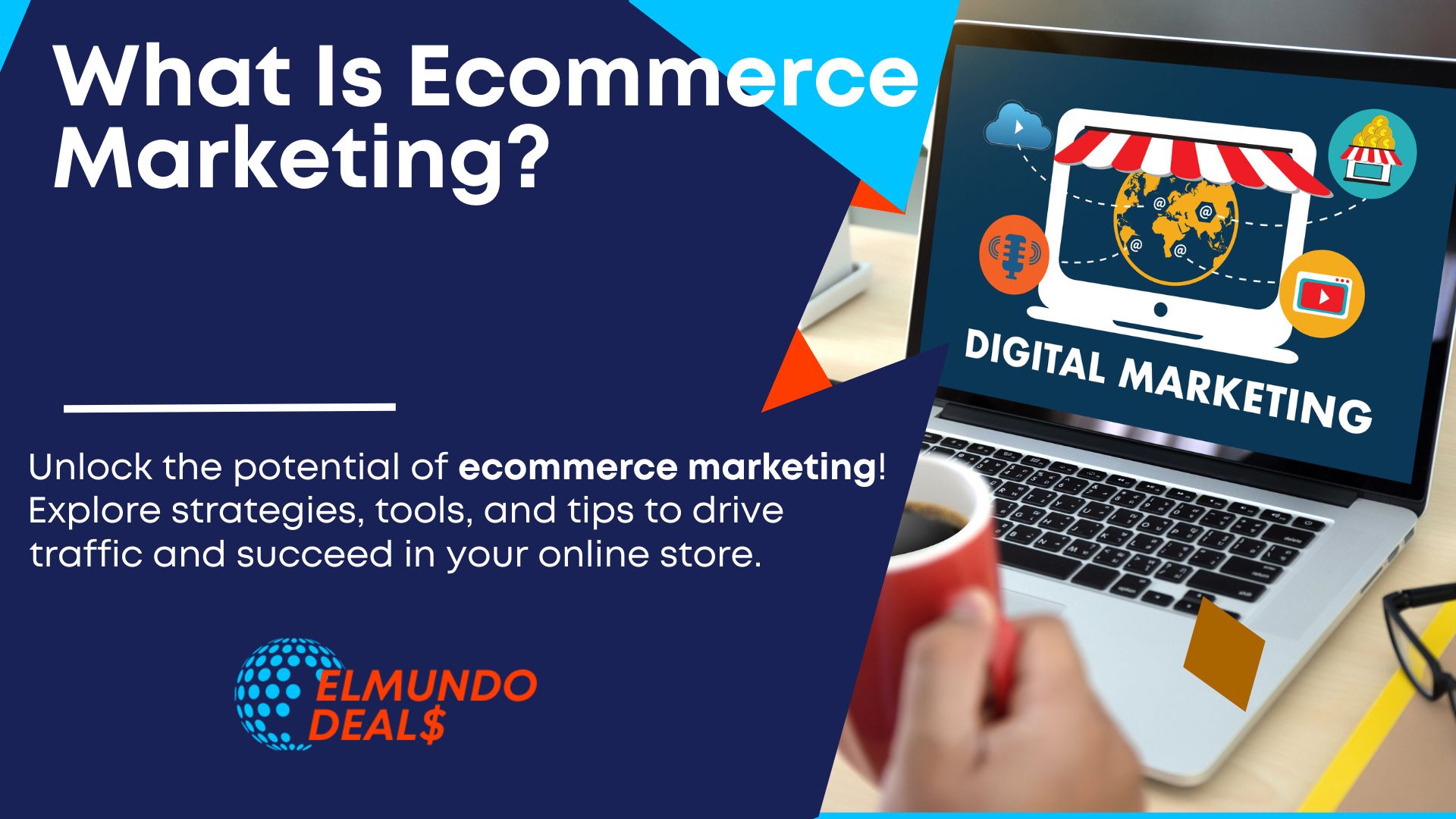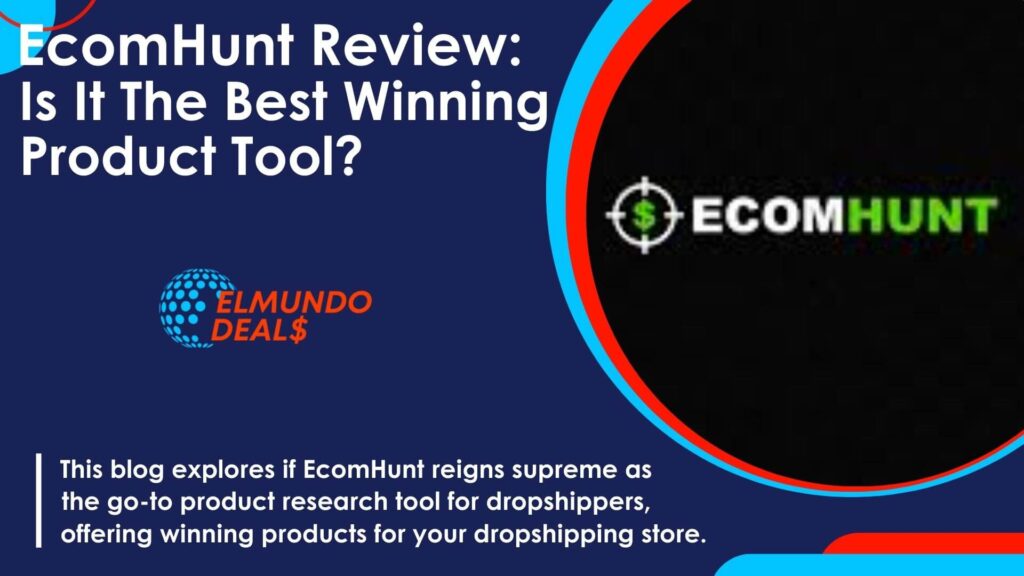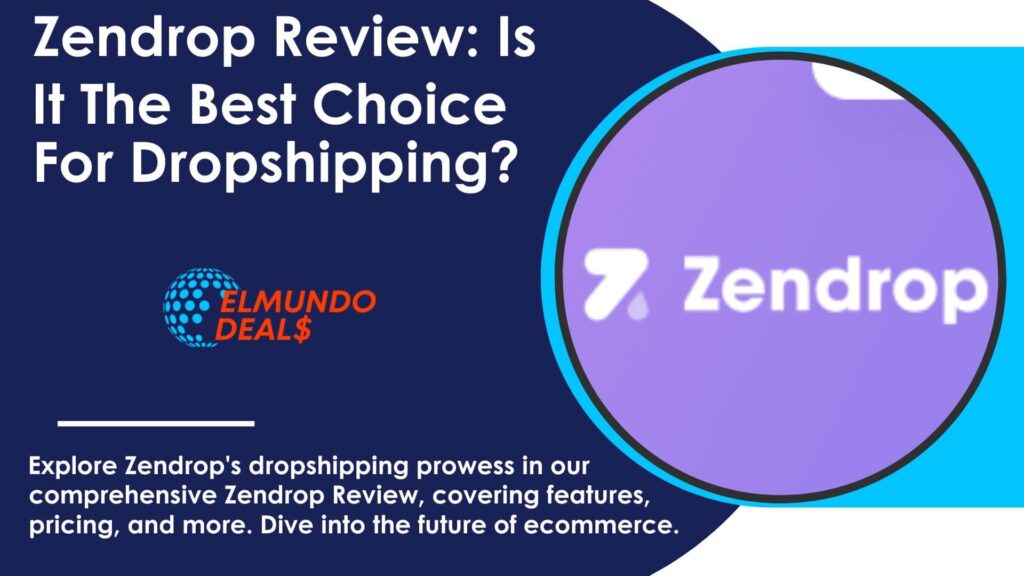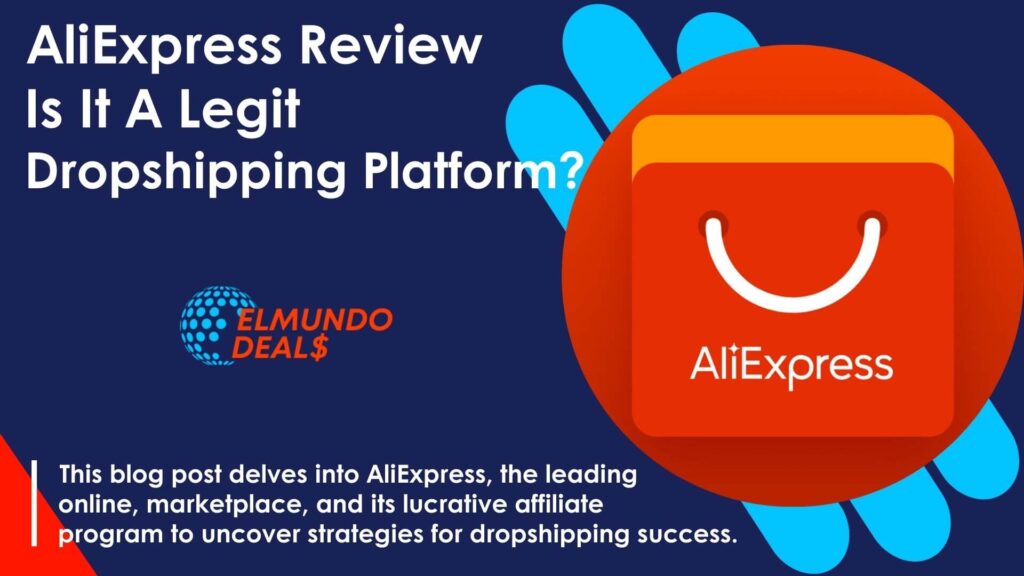What Is Ecommerce Marketing? – Marketing Strategies, Tools, Tips, Platform, Marketing Guide & More.
Prepare to unlock the vault of ecommerce success and embark on a journey that will forever transform your online business. In this exhilarating exploration of ecommerce marketing, we will delve deep into its intricate web of strategies, tools, and tips, leaving no stone unturned.
Brace yourself for a mind-bending adventure as we navigate the labyrinth of psychological hooks, urgency-inducing techniques, and engagement-enhancing tools. The clock is ticking, and the competition is fierce, but fear not, for we hold the key to unlocking your ecommerce potential.
Get ready to discover the secrets, master the strategies, and rise above the rest in this thrilling quest for ecommerce domination. It’s time to seize the moment and embark on an unforgettable journey into the heart of ecommerce marketing excellence.

What is Ecommerce Marketing?
Ecommerce marketing definition
Ecommerce marketing is the dynamic fusion of strategic marketing principles and techniques, all orchestrated to propel the promotion and sale of products or services through online platforms.
This multifaceted approach encompasses diverse digital strategies, including email marketing, SEO, social media, and content marketing. Ecommerce marketing aims to drive a targeted influx of traffic to online stores, fuel conversions, and ignite the flames of revenue generation.
By skillfully wielding these tools, businesses can navigate the ever-evolving digital landscape, seamlessly connecting with their desired audience and charting a course toward unparalleled triumph in online commerce.
What Are the Types of Ecommerce Marketing?
Exploring the diverse range of ecommerce marketing strategies is crucial to reach and engaging your target audience effectively. Let’s embark on an illuminating journey through the most impactful approaches in ecommerce marketing.
Ecommerce SEO
Search engine optimization acts as the lifeblood for driving organic traffic to your ecommerce website. By skillfully optimizing your site’s structure, content, and metadata, you can amplify its visibility in search engine results pages. This, in turn, magnetizes potential customers who actively seek products or services like yours, creating a steady stream of high-quality leads.
Email marketing
Harness the power of email marketing, a formidable tool to captivate and nurture your audience, fostering lasting customer relationships. Building an email list and crafting targeted campaigns allows you to deliver value-packed content, unveil new product launches, extend exclusive discounts, and inspire repeat purchases. With each carefully crafted email, you cultivate trust, loyalty, and increased customer lifetime value.
Conversion rate optimization
The art of conversion rate optimization centers around crafting a captivating experience that compels website visitors to take desired actions. You sculpt a seamless conversion funnel by deploying A/B testing, enhancing user experience, and weaving persuasive copywriting.
Each subtle refinement harmoniously guides visitors towards making purchases or subscribing to your newsletter, propelling revenue to new heights.
SMS marketing
Enter the realm of SMS marketing, a personalized and instantaneous avenue to directly engage customers through their mobile devices. With SMS, you can effortlessly disseminate promotions, convey essential updates, and deliver time-sensitive notifications.
This intimate connection ensures your brand remains at the forefront of customers’ minds, fueling engagement and bolstering brand loyalty.
Organic social media marketing
Unleash the power of social media platforms like Facebook, Twitter, and Instagram to forge a compelling online presence. Engaging your audience, nurturing a thriving community, and amplifying brand awareness becomes second nature.
By sharing valuable content, running captivating contests, and actively conversing with your followers, you cultivate a robust online ecosystem that drives traffic to your ecommerce store.

Paid social media marketing
Venture into paid social media advertising, a domain that enables you to target demographics, interests, and behaviors precisely. By strategically investing in tailored ads on platforms like Facebook Ads and Instagram Ads, you expand your brand’s reach, ignite a surge of traffic, and witness a rise in conversions.
It’s a gateway to unlocking untapped potential and breathing life into your marketing campaigns.
Search advertising
Enter the dynamic world of search advertising, where your brand instantly shines when users search for keywords relevant to your products or services. Your brand enjoys immediate visibility as pay-per-click (PPC) ads grace search engine results pages.
This powerful tactic propels a wave of targeted traffic to your online store, ushering in a flurry of potential customers ready to explore what you have to offer.
Affiliate marketing
Forge strategic partnerships with influencers or businesses to unlock the immense potential of affiliate marketing. You tap into their expansive reach and influence by collaborating with influential personalities and offering them a commission on sales generated through their referrals. This symbiotic relationship expands your customer base, heightens brand exposure, and fuels a surge of conversions.
Partnerships
Envelop your brand in a tapestry of strategic partnerships with complementary brands or industry influencers. By joining forces and embarking on collaborative marketing campaigns, joint ventures, or co-branded content, you broaden your reach, captivate new audiences, fortify your brand image, and witness an upsurge in sales.
PR and brand awareness
Unleash the formidable power of public relations and brand awareness campaigns to reshape the destiny of your ecommerce business. By securing media coverage, immersing yourself in industry events, or forging partnerships with influential figures, you unlock the keys to enhancing your brand’s visibility, credibility, and reputation.
The ripple effect is undeniable as your brand emerges from the shadows, captivating the attention of a wider audience. Each step you take towards amplifying brand awareness paves the way for increased traffic, heightened conversions, and an unparalleled impact on your bottom line.
Ecommerce content marketing
Content marketing is a cornerstone in ecommerce strategies, forging powerful connections with your target audience. It involves creating and disseminating valuable, relevant, and captivating content designed to captivate and engage. Let’s explore the critical elements of ecommerce content marketing, unlocking the secrets to success.
- Blogs and Articles: Unleash the power of informative and captivating blog posts and articles tailored to your products or industry. As you share valuable insights and knowledge, your brand emerges as an authoritative figure, attracting organic traffic to your website. You cultivate trust, loyalty, and an eager audience through well-crafted storytelling and thought leadership.
- Product Descriptions: Embark on a journey of crafting compelling and persuasive product descriptions. By spotlighting your offerings’ unique features, benefits, and value propositions, you ignite a spark of desire within potential customers. These tantalizing descriptions become a bridge between curiosity and conversion, inspiring action and propelling your business forward.
- Video Marketing: Unlock the immersive power of videos to showcase your products, provide tutorials, and share customer testimonials. Videos possess an inherent magnetism, capturing attention, evoking emotions, and significantly influencing purchase decisions. You paint a vivid picture of your brand through visual storytelling and compelling narratives, leaving an indelible mark on viewers’ minds.
- Social Media Content: Harness the vast potential of social media platforms to forge personal connections with your audience. You tap into the heart of social interaction through engaging content enriched with visuals, infographics, and user-generated content. Each piece of content becomes a vessel for dialogue, capturing attention, generating shares, and expanding your brand’s reach to new horizons.
- User-generated Content: Ignite the power of social proof by actively encouraging customers to share their experiences, reviews, and testimonials. You create an environment of trust and authenticity by showcasing real-life interactions and positive feedback. Potential customers witness the genuine satisfaction of others, instilling confidence and nudging them closer to making a purchase.


Read more:
- 7 Best Inspiring Ecommerce Pricing Strategies For Your Products
- 7 Best Shopify Alternatives In 2023 To Skyrocket Your Ecommerce
- The Pros And Cons Of Selling On Amazon Vs EBay – Better For Sellers?
- The Pros And Cons Of Selling Online On Shopify Vs Etsy In 2023
- Pros And Cons Of Starting A Print On Demand & Grow Your Business
4 Key Benefits of Ecommerce Marketing
Unlocking the true potential of ecommerce marketing opens doors to many advantages that can propel your business toward unprecedented growth. Let’s embark on a journey to explore the four key benefits that await those who embrace effective ecommerce marketing strategies.
1. Lowers Transaction Costs
Ecommerce is a gateway to lower transaction costs compared to traditional brick-and-mortar stores. By eliminating the need for physical retail locations, rent, utilities, and staffing expenses are significantly reduced.
The cost savings garnered can be strategically reinvested into marketing efforts, amplifying brand exposure, driving customer acquisition, and propelling the growth trajectory of your business.
2. Maintain an Accurate Customer Database
Ecommerce platforms offer a treasure trove of valuable data and insights about your customers. By harnessing the power of these platforms, you gain an in-depth understanding of their preferences, behaviors, and purchase history.
Armed with this wealth of information, you can personalize your marketing campaigns, precisely target your audience, and deliver tailored experiences that resonate deeply. The result? Enhanced customer satisfaction, increased engagement, and an enduring bond between your brand and its loyal customers.
3. Improves the Customer Experience
Ecommerce marketing paves the way for crafting personalized and tailored experiences for your customers. You can create a truly unique journey for each individual through the power of targeted emails, customized recommendations, and personalized content.
You capture attention, foster loyalty, and inspire repeat purchases by delivering relevant and timely messages. The exceptional customer experience you curate becomes a testament to your brand’s commitment to excellence, setting you apart from the competition and ensuring long-term success.
4. Allows You to Reach More People
The advent of ecommerce obliterates the geographical barriers that once limited your reach. No longer confined to a specific locality, you can expand your customer base globally, reaching individuals in different regions and time zones.
This newfound ability to transcend boundaries opens up a world of growth opportunities for your business. With a broader reach, you tap into new markets, forge connections with diverse cultures, and create a global presence that sets the stage for unparalleled success.

10 Best Ecommerce Marketing Strategies
In the dynamic world of ecommerce, implementing effective marketing strategies is paramount to your success. To help you navigate this landscape and achieve remarkable results, we present ten proven strategies that can elevate your ecommerce marketing efforts.
1. Define your target audience and market.
Gain a deep understanding of your ideal customer profile—their demographics, needs, preferences, and pain points. This knowledge becomes the bedrock for crafting targeted marketing campaigns and resonating messaging that captivates their attention and drives conversions. By speaking directly to your audience’s desires, you forge a powerful connection that propels your business forward.
2. See what your competitors are doing.
Embark on a journey of thorough competitor research. Analyze their strategies, tactics, and marketing channels. Identify what sets them apart and where they excel. By understanding their strengths and weaknesses, you can differentiate yourself, uncover new opportunities, and position your brand in a way that captivates your target audience.
3. Set targets based on benchmarks.
Establish clear, measurable goals for your ecommerce marketing campaigns. Draw upon industry benchmarks and analyze past performance data to set realistic targets. Whether it’s increasing website traffic, boosting conversion rates, or enhancing customer retention, having well-defined goals keeps your marketing efforts on track and enables you to measure success.
4. Research marketing tools that can help you.
Explore a range of marketing tools and platforms that align with your goals and budget. These tools can automate processes, streamline workflows, and enhance your overall marketing effectiveness. From email marketing automation to social media management tools, investing in the right resources can save time, optimize campaigns, and drive exceptional results.
5. Add more marketing channels as you find your ground.
Start with a core marketing channel set that aligns with your target audience and business objectives. As you gain insights and understand which channels drive the best results, gradually expand your reach into new media. Experiment, track performance, and focus your efforts on the channels that yield the highest return on investment.
6. Automate as much as possible
Embrace the power of marketing automation to streamline repetitive tasks and maximize efficiency. By automating processes such as email campaigns, social media scheduling, and customer segmentation, you free up time to focus on strategic aspects of your ecommerce marketing. Automation saves time and ensures consistent and timely communication with your audience.
7. Personalize your communication
Leverage the wealth of customer data at your disposal to deliver personalized and relevant messages. Segment your audience based on demographics, purchase history, and preferences.
Tailor your content to address their specific needs, desires, and pain points. This level of personalization creates a sense of connection and relevance, leading to increased engagement, conversions, and brand loyalty.
8. Measure your ecommerce marketing results, and refine and reuse what works.
Regularly analyze the performance of your marketing campaigns using key metrics such as conversion rates, click-through rates, and return on investment (ROI). Identify which strategies are driving the best results and optimize or replicate them across your marketing efforts.
You continuously improve and maximize your marketing impact by constantly refining your approach based on data-driven insights.
9. Build loyalty into your strategy.
Prioritize customer retention by implementing loyalty programs, personalized discounts, and exclusive offers. Focusing on building long-term customer relationships fosters brand advocacy and repeat purchases.
Engage with your customers beyond the initial sale, nurturing their loyalty through personalized experiences and exceptional customer service. Satisfied customers become your brand ambassadors, amplifying your reach and driving sustainable growth.
10. Focus on profitability, not just sales.
While driving sales is essential, profitability should remain a key focus. Analyze your marketing costs, customer acquisition costs, and lifetime value to ensure your marketing efforts generate a positive return on investment (ROI). It’s crucial to strike a balance between driving sales and maximizing profitability.
By monitoring and optimizing your marketing costs, you can ensure that each campaign contributes to the overall financial health of your business.
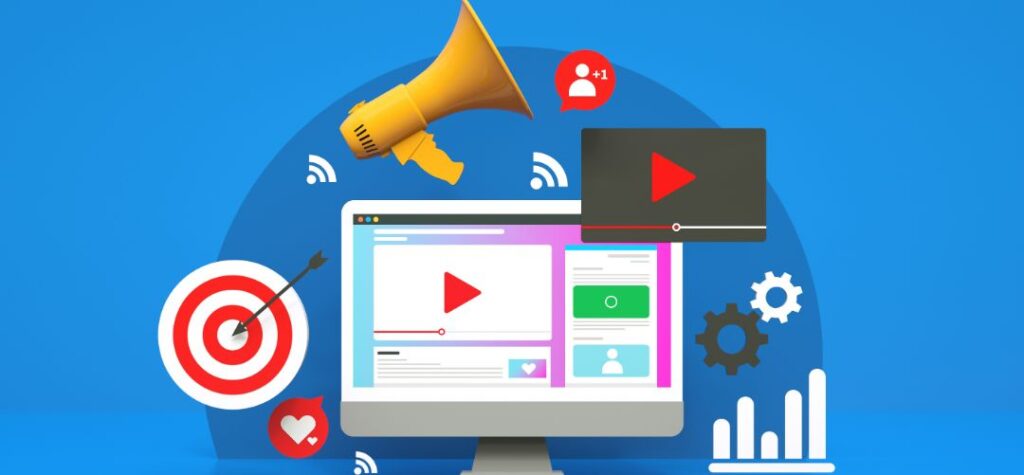
Types of Ecommerce
In the vast realm of ecommerce, understanding the different types is paramount to developing tailored marketing strategies that resonate with your target audience. Let’s dive into the six main types of ecommerce and explore the distinctive characteristics and marketing approaches associated with each category.
Business-to-Business (B2B)
B2B ecommerce revolves around businesses selling products or services to other companies. Marketing in the B2B space often involves targeted advertising, lead generation, and relationship-building efforts. Key strategies focus on showcasing expertise, delivering valuable content, and establishing trust.
Building strong professional relationships, networking at industry events, and leveraging digital channels to reach key decision-makers are critical for success in the B2B realm.
Business-to-Consumer (B2C)
B2C ecommerce entails businesses selling products or services directly to individual consumers. Marketing strategies in the B2C space center around creating compelling and personalized shopping experiences.
It includes leveraging social media platforms, optimizing the online purchasing process, and utilizing targeted advertising to capture the attention of consumers. Engaging storytelling, visual aesthetics, and customer reviews are vital in building brand loyalty and driving conversions.
Business-to-Government (B2G)
B2G ecommerce involves businesses selling products or services to government entities. Marketing to government agencies requires a comprehensive understanding of specific procurement processes and compliance requirements.
Strategies in B2G ecommerce focus on building relationships with government decision-makers, providing customized solutions, and demonstrating expertise in navigating government regulations.
Consumer-to-Consumer (C2C)
C2C ecommerce empowers consumers to directly sell products or services to other consumers through online platforms or marketplaces. Marketing in the C2C space revolves around building trust and facilitating transactions.
User-generated content, customer reviews, and ratings play a crucial role in establishing credibility. Engaging with the community, fostering positive interactions, and providing excellent customer support are critical drivers of success in C2C marketing.
Consumer-to-Business (C2B)
In C2B ecommerce, consumers offer products or services to businesses. It includes freelancers, consultants, or influencers marketing their skills or expertise to potential clients.
C2B marketing strategies involve showcasing unique value propositions, establishing credibility, and positioning oneself as an industry expert. Leveraging personal branding, content marketing, and networking within professional circles are essential for attracting business clients.
Consumer-to-Government (C2G)
C2G ecommerce entails consumers providing products or services to government entities. It can include individuals or businesses offering specialized services, licenses, or permits. Marketing in the C2G space requires a deep understanding of government procurement processes and compliance standards.
Strategies focus on demonstrating expertise, addressing government-specific needs, and fostering strong relationships with relevant government agencies.

How to Write an Ecommerce Marketing Plan
Crafting a robust ecommerce marketing plan is the cornerstone of driving success in the digital realm. To guide your marketing efforts effectively, consider including the following critical elements in your project:
- Executive Summary: Provide a concise yet comprehensive overview of your business, the market landscape, and marketing goals. Paint a clear picture of your brand’s identity, mission, and unique value proposition.
- Market Research: Conduct thorough market research to gain deep insights into your target audience, competitors, and industry trends. Understand your audience’s preferences, behaviors, and pain points, enabling you to tailor your marketing strategies to resonate with their needs.
- Marketing Goals and Objectives: Clearly define your marketing goals and objectives. Whether it’s increasing website traffic, improving conversion rates, expanding into new markets, or enhancing customer engagement, articulate these goals with precision.
- Target Audience: Identify your target audience’s demographics, psychographics, online behaviors, and purchasing patterns. By deeply understanding your audience, you can craft compelling, personalized marketing messages that resonate with their desires.
- Marketing Strategies: Outline your specific marketing strategies and tactics to achieve your goals. To maximize your reach and impact, consider utilizing a mix of approaches, such as search engine optimization (SEO), social media marketing, email campaigns, content marketing, and paid advertising.
- Budget and Resources: Determine your marketing budget and allocate resources across various marketing channels and campaigns. Strike a balance between cost-effectiveness and optimal exposure, ensuring your budget aligns with your desired outcomes.
- Marketing Calendar: Develop a well-structured marketing calendar to schedule and organize your marketing activities. It includes content creation, email campaigns, social media posts, and promotional events. A clear timeline ensures consistency and allows for seamless execution.
- Key Performance Indicators (KPIs): Define the key metrics that will gauge the success of your marketing efforts. These may include website traffic, conversion rates, customer acquisition costs, return on investment (ROI), or customer lifetime value (CLV). Regularly monitor these KPIs to measure progress and make informed decisions.
- Implementation Plan: Break down your marketing strategies into actionable steps. Outline the specific tasks, allocate responsibilities to team members, and set realistic deadlines. A well-defined implementation plan ensures smooth execution and accountability.
- Monitoring and Evaluation: Establish mechanisms for monitoring and evaluating the performance of your marketing campaigns. Regularly analyze the data, draw insights, and make data-driven adjustments to optimize your strategies. Continual evaluation is essential for staying agile in the ever-evolving digital landscape.
- Contingency Plan: Anticipate potential challenges or obstacles that may arise during your marketing campaigns. Develop contingency plans to address these scenarios promptly, ensuring your marketing efforts stay on track.
- Review and Optimization:
- Schedule regular inspections of your marketing plan to assess its effectiveness.
- Identify areas for improvement, leverage data-driven insights, and optimize your strategies and tactics accordingly.
- Embrace a culture of continuous improvement to stay ahead of the competition.
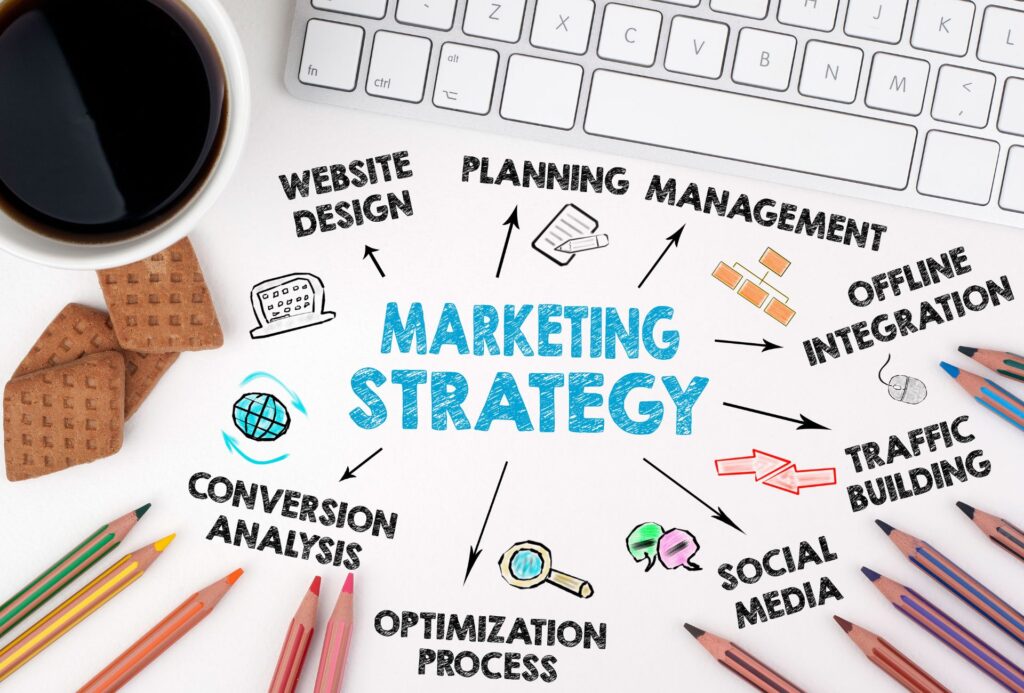
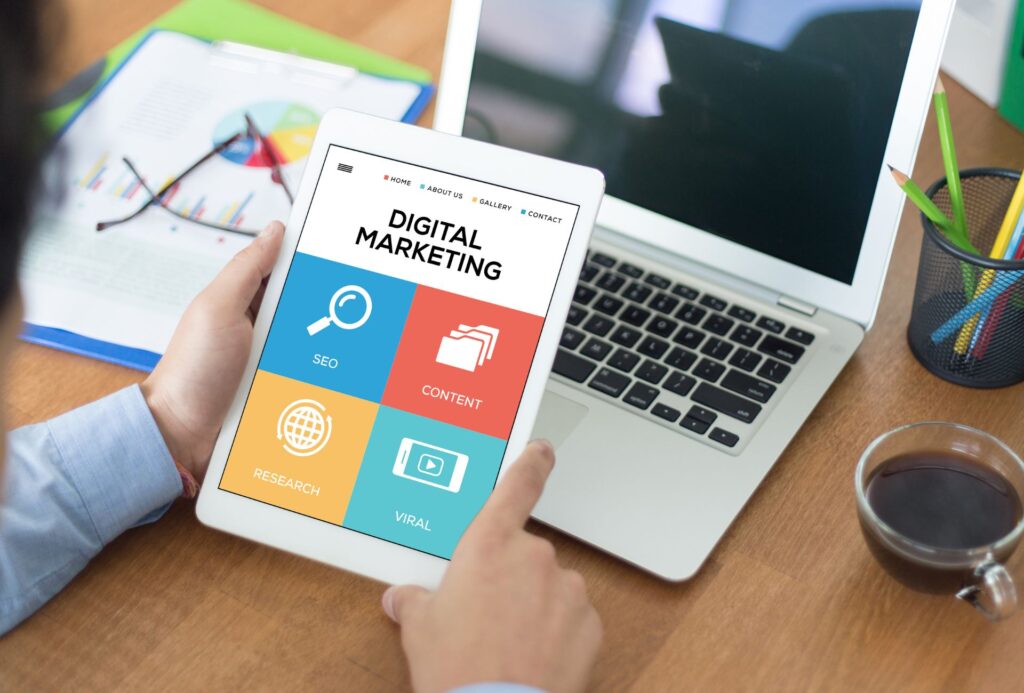
Also check the following:
- 9 Tips For Writing Product Descriptions That Sell Instantly
- 7 Best Payment Gateways For Shopify Stores In 2023: Payment Method
- Ecommerce Reselling Laws 2023: Stay Compliant & Avoid Legal Issues
- 9 Benefits Of Using A VPN For E-Commerce Business
- 10 Unbelievable Winning Shopify Dropshipping Store Examples (2023)
Wrap-up: What is Ecommerce Marketing Essential to Business Success?
Discover the true power of your online business by embracing a diverse array of strategies that propel growth. From harnessing the force of SEO, email marketing, and social media advertising to the artistry of content marketing, these tactics hold the key to unlocking your business’s full potential.
Throughout this enlightening journey, we have stressed the significance of comprehending your target audience, vigilantly monitoring your competitors, establishing quantifiable objectives, and perpetually refining your strategies with data-driven insights.
By delving into the depths of your audience’s desires, aligning your strategies with emerging trends, and sculpting a laser-focused plan, you will propel your online business to unforeseen heights of success.
Remember, the journey toward achievement in ecommerce marketing is not a linear path. It demands the nimble agility to adapt, the relentless pursuit of knowledge, and the artistry of delivering remarkable experiences to your valued customers.
So, brace yourself for the boundless possibilities that await. Take hold of these proven strategies, breathe life into your business, and redefine what is attainable in the realm of ecommerce.
In this exhilarating voyage, allow your creative genius to flourish as you fuse innovation with data-backed insights. Let the unique essence of your brand captivate your audience, resonating with them on a deeply emotional level and forging persistent connections.
With a clear vision, unwavering determination, and the wisdom gained from this transformative journey, you can confidently navigate the intricate world of ecommerce marketing. Apply these invaluable principles, fuel your growth with relentless dedication, and savor the sweet taste of success.
As you venture forth, remember that true triumph emerges from the intersection of passion, strategy, and unwavering persistence. Embrace the challenge, surpass all expectations, and carve your indelible mark in the ever-evolving landscape of ecommerce.
Embrace this opportunity to transform your online business into an unstoppable force driven by innovation, fueled by insights, and empowered by your profound impact on your target audience.
The moment is now. Seize it. Embody the essence of ecommerce marketing and claim the prosperous future that awaits.

